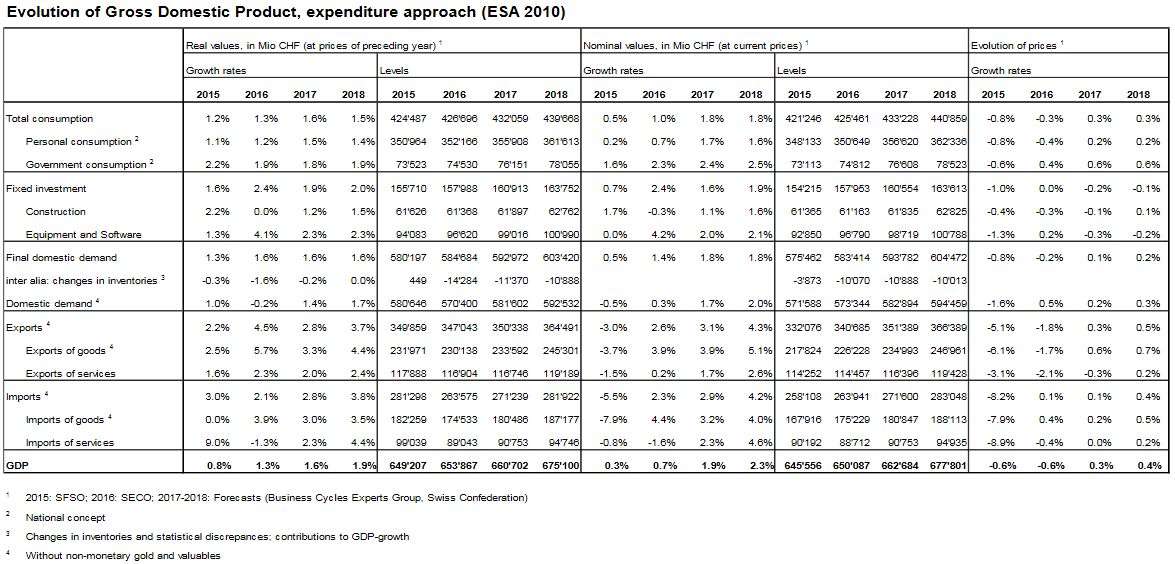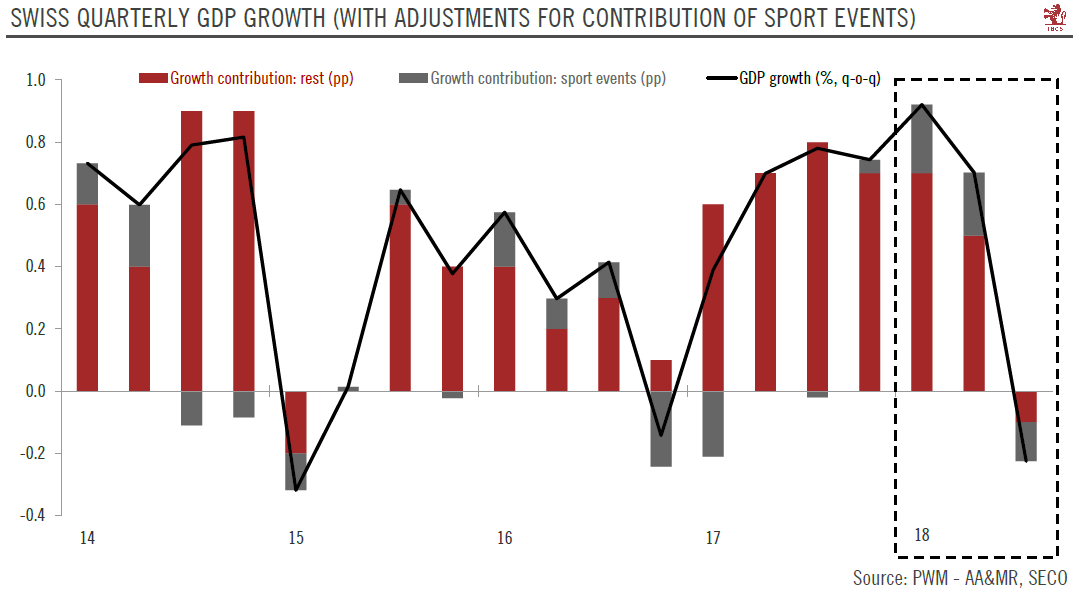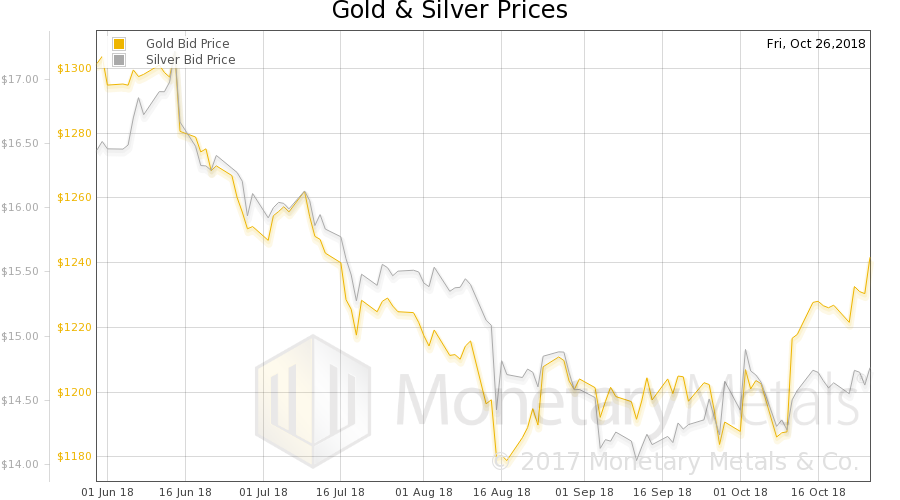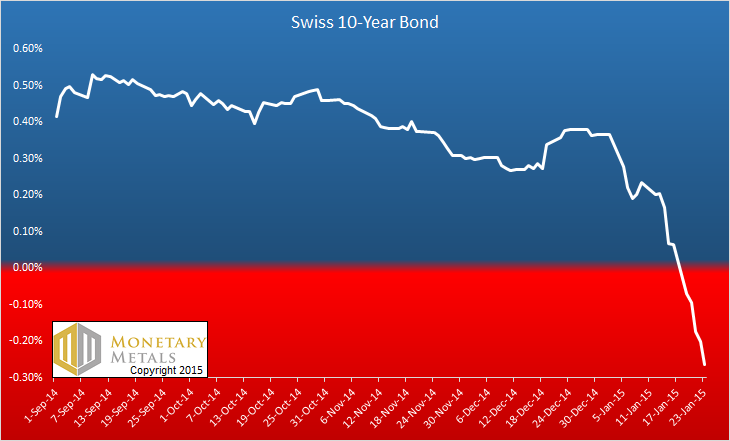Economic forecasts by the Federal Government’s Expert Group – spring 2017*. Swiss economic growth turned out disappointingly weak in the second half of 2016. However, the leading indicators are pointing to a clear upward trend in early 2017 and the global economy is sending out positive signals. The Federal Government’s Expert Group is therefore expecting growth in gross domestic product (GDP) to accelerate to +1.6% in 2017 (previously +1.8%) and to +1.9% in 2018 (unchanged), underpinned by domestic demand in particular. The Group also expects the job market to benefit from the economic recovery, anticipating, as before, that unemployment will drop to 3.2% in 2017 and 3.1% in 2018.
International economyThe global economy gathered some speed towards the end of 2016. Global industrial output and international trade have gained momentum and sentiment indicators around the world, including the global Purchasing Managers’ Index (PMI) for industry, are indicating a positive start to 2017.Up +0.5% on the previous quarter, economic growth in the USA proved solid in the 4th quarter of 2016. The job market data and leading indicators are also showing signs of a robust economy in early 2017. The US economy is likely to grow somewhat faster throughout the forecast period than in 2016. At +0.4%, the growth rate in the Euro area remained unchanged on the previous quarter and the economic upturn seems stable overall. Although there remains a certain unevenness amongst the member states, the gaps between individual countries’ rates of growth have nevertheless narrowed, leading the Expert Group to expect moderate growth in the Euro area to continue. The Japanese economy once again outgrew its potential, a trend which may tend to level off in 2017 and 2018.China’s GDP largely maintained its momentum from previous quarters in the 4th quarter of 2016 and expanded by 6.8% in comparison to the same quarter of the previous year. The anticipated soft landing seems to be materialising and looks likely to continue in 2017 and 2018. Thanks to brighter economic conditions in Russia, the prospects for the BRIC countries (Brazil, Russia, India, China) as a whole are also encouraging.Overall, the global development is in line with the Expert Group’s previous expectations. The global economy’s moderate expansion is expected to continue in 2017 and 2018, with positive repercussions for Swiss foreign trade. |
Comparison of Forecasts of March 17 and December 16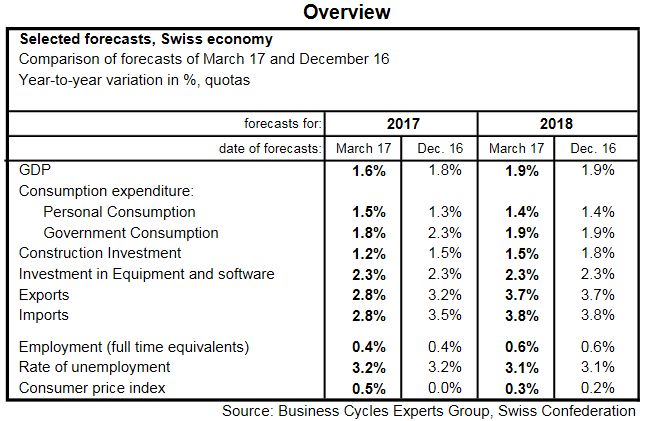 Source: news.admin.ch - Click to enlarge |
Economic situation and forecasts for SwitzerlandAfter a dynamic first half of 2016, GDP growth in Switzerland lagged behind expectations in the last two quarters with growth rates to the previous quarter of +0.1% each. In the 4th quarter, GDP growth was dragged down by the industrial sector in particular. Hence, the Swiss economy has temporarily lost momentum in its recovery from the effects of the sharp rise in the Swiss franc in early 2015.However, the most recent data is indicating accelerated growth in the near future. Exports of goods performed extremely well in January 2017, for instance, particularly chemicals and pharmaceutical products – the sector that had a surprisingly poor final quarter of 2016. Sentiment indicators have also brightened further recently.The Federal Government’s Expert Group is anticipating GDP growth of 1.6% for fullyear 2017. In comparison to the previous forecast (+1.8% for 2017), this represents a slight technical downward adjustment resulting from the sluggish close of 2016 (base effect). Growth is nevertheless expected to step up significantly over the coming quarters, largely offsetting the lack of momentum at the turn of 2017. As previously forecast, GDP growth is likely to reach 1.9% in 2018, meaning the Swiss economy would continue to recover at a solid albeit not exceptionally strong rate. |
 Source: news.admin.ch - Click to enlarge |
| Domestic demand looks set to have a substantially positive impact on growth over both forecast years. After a patchy 2016, private consumption should gain strength against the back-drop of a recovering job market and steady population growth. Due to still full order books in the structural engineering industry and major public building projects, investments in construction are also set to gain momentum over the coming quarters. The increased optimism amongst Swiss companies suggests that investments in equipment will expand moderately over the forecast period.
After a strong 2016 for foreign trade, the trend is set to return to more moderate growth rates in 2017 and 2018 to some extent. Foreign trade is likely to contribute positively to GDP growth over both forecast years. The promising outlook for the global economy also spreads to Swiss exports. Provided the Swiss franc does not again appreciate strongly, growth in exports could prove more broad-based than in the previous year. For instance, the machinery, electronics and metal industry is confident and could benefit from the faster growth rates in the export markets. On the job market, the turnaround following the economic slowdown in 2015 seems to be solidifying gradually. The number of registered unemployed people, adjusted for seasonal and irregular variations, has dropped slightly since September 2016, while sentiment indicators about the job market also suggest greater optimism. Therefore, the Expert Group expects that, as the recovery proceeds, the labour market will pick up. The unemployment rate should fall gradually to 3.2% on average for 2017 and ultimately to 3.1% for 2018. After a poor 2016, employment growth also looks set to accelerate to 0.4% and 0.6% in 2017 and 2018 respectively. Due to the sharp rise in oil prices across the globe, amongst other reasons, inflation is expected to return to positive territory also in Switzerland over the forecast period. The rate of inflation is predicted to reach +0.5% on average in 2017 and +0.3% in 2018. |
 Source: news.admin.ch - Click to enlarge |
Economic risksPolitical uncertainty continues to pose the greatest risks to global economic development. In particular, the direction of US economic and trade policy remains unclear. Possible protectionist measures would hit exportoriented countries, while GDP growth in the USA could benefit from fiscal policy stimulus, although the ongoing normalisation of monetary policy could curb this growth. The net impact on the Swiss economy is virtually impossible to quantify at this stage.The upcoming elections in France and ongoing underlying problems in the Italian banking sector also pose risks to the international arena. In addition, it remains unclear how the Brexit vote will be implemented precisely. The Swiss economy would be particularly affected if these uncertainties pushed the franc up further – an outcome that could very well cancel out some of the positive effects of the global economic recovery on Swiss foreign trade.A key domestic risk is the potential for a further slowdown in the construction market. After a six-year-long boom, in 2015 the construction industry entered a period of consolidation that lasted until late 2016. This sector could be further affected given the number of empty apartments, which is already on the rise, in addition to falling net migration and the expected rise in interest rates over the forecast period. |
 Source: news.admin.ch - Click to enlarge |
Full story here Are you the author? Previous post See more for Next post
Tags: newslettersent,swiss,Swiss economy









